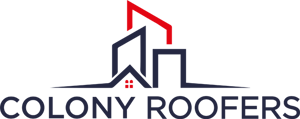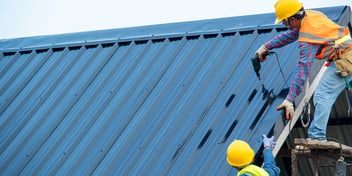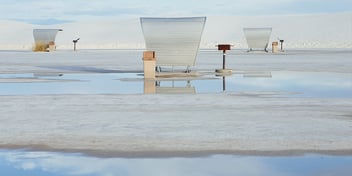- Home »
- Learningcenter »
- How to clean roof
How to Clean a Roof: Flat, Shingles, Frequency & More
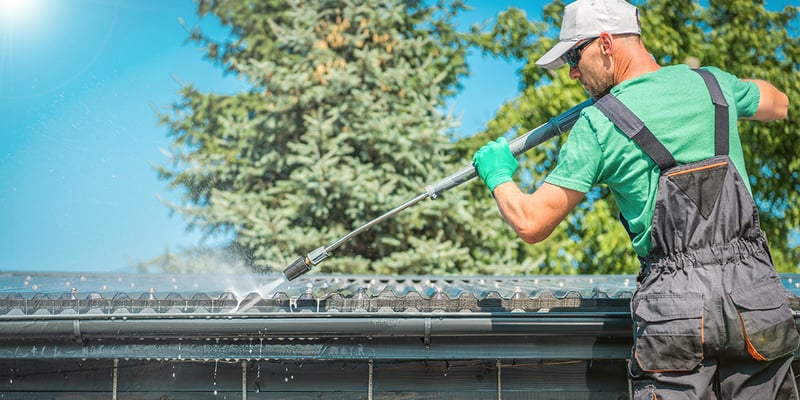
Cleaning your roof doesn’t just make your building or home look better and boost your curb appeal; it can also increase the lifespan of your roofing system and ensure that any issues are caught early on before they require expensive and extensive repairs.
How do you go about cleaning a roof, though? Is it worth cleaning your roof, or should you hire a professional?
If you choose to clean your roof yourself, you’ll want to do your research first. Using the wrong chemicals on your roofing material can cause significant, expensive damage, and not taking the proper safety precautions can result in serious injury.
So, without further ado, let’s look at what the process of roof cleaning entails and everything else you’ll want to know about keeping your roof free of algae, moss, dirt, and debris.
How to Clean a Flat Roof
If you have a commercial building with a flat roof that is easy to access, you might be wondering whether it’s worth it to take on the task of cleaning it yourself.
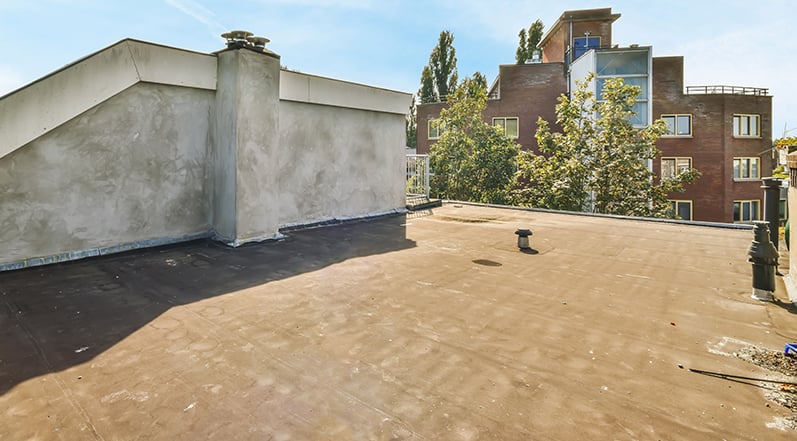
Let’s take a look at the general steps you will need to take to help you decide whether or not it’s a project you want to complete on your own.
-
General Maintenance
Before you begin cleaning your roof, you’ll want to take care of some general maintenance tasks. If there is any standing water on your roof, you’ll want to remove it first. You’ll also need to remove any larger debris from the roof before you start cleaning.
If landscaping or garden beds are near the building, take steps to protect both the soil and the plants, as the soil can be contaminated, and the plants can be damaged (or even killed) by bleach or chlorine solutions.
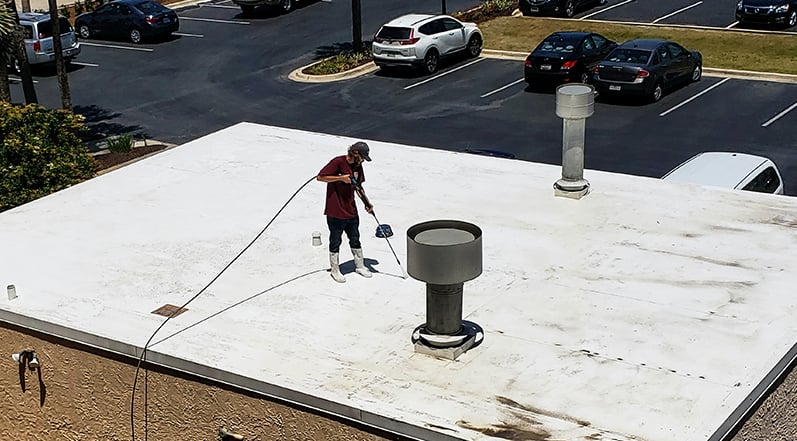
Another important step in the roof cleaning process is cleaning your gutters to ensure they are free from leaves, debris, and other materials that could clog your drainage system.
-
Choosing Your Cleaning Method
You have a handful of options for cleaning your flat roof, each of which has pros and cons.
The first option is using a pressure washer, which can easily remove algae and moss and effectively clean your flat roof. One of the benefits of this method is that it doesn’t use any chemicals, meaning that you don’t have to worry about the soil and plants around your building being contaminated or damaged.
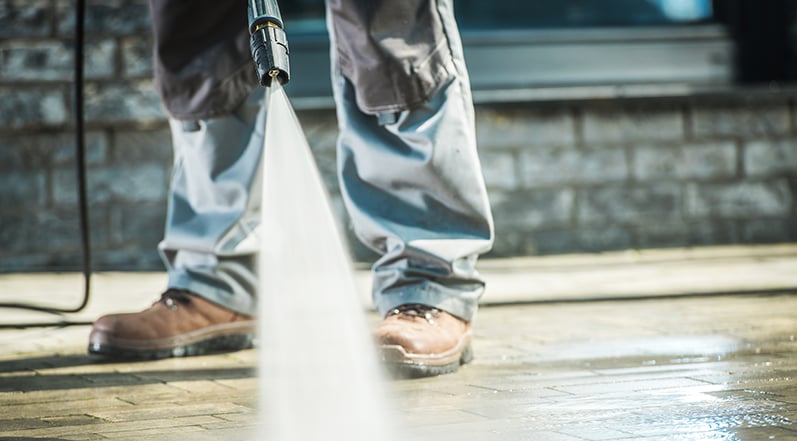
The second option is using a chlorine-based wash. Compared to pressure washing, using a chlorine-based wash is much less time-consuming, meaning you’ll put less wear and tear on your roof during the process. At the same time, chlorine can be toxic to animals, plants, and even people, so you’ll want to weigh out the pros and cons before choosing this option.
Finally, you can also use sodium hydroxide instead of chlorine if you’d prefer. This method requires more extensive rinsing than the chlorine solution, and ensuring your solution isn’t too concentrated is important. You’ll want to use extreme caution when using sodium hydroxide because using a solution that is too concentrated can cause damage to your roofing material.
How to Clean an Asphalt Shingle Roof
Most houses in the U.S. have asphalt shingle roofs, so many different roof-cleaning products are on the market aimed at consumers.
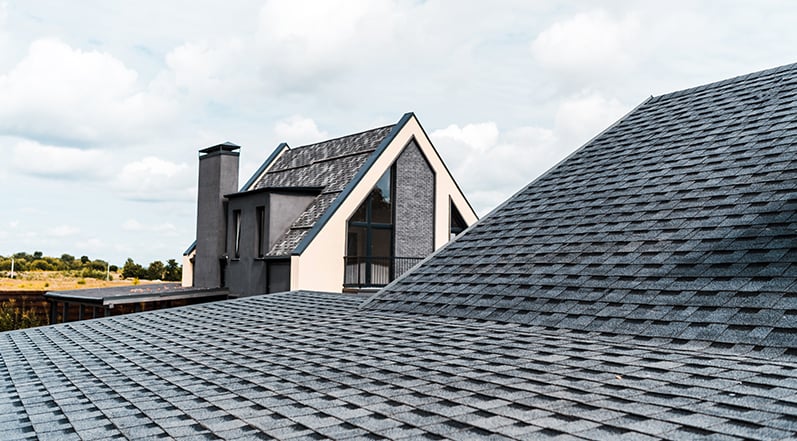
You’ll want to consider your goals before choosing a product and whether or not you feel comfortable working on a ladder to clean your roof.
-
General Maintenance
Just like when you’re cleaning a flat roof, the first thing you’ll want to take care of when cleaning an asphalt shingle roof is some general maintenance tasks. Clean out your gutters to ensure they can carry water away from your building effectively.
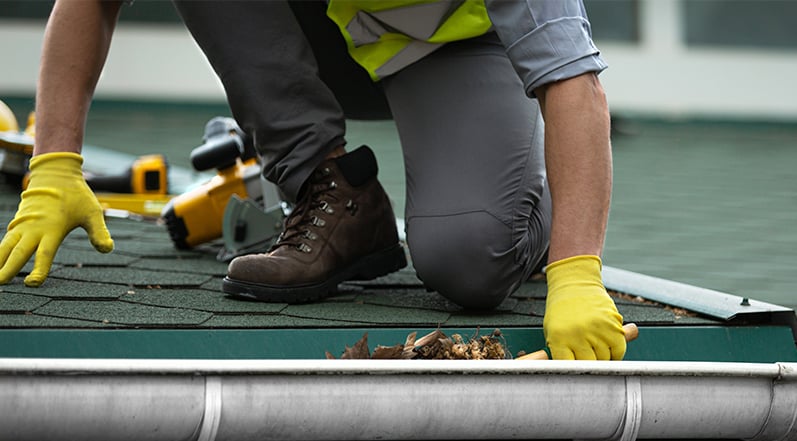
You’ll also want to take steps to protect any plants that are near your home or building. Before you begin your project, thoroughly water any plants or shrubbery before you cover them up with plastic. If you use bleach or other potentially harmful solution on your roof, you’ll also want to rinse your plants after the cleaning.
-
Choose Your Cleaner
There are a number of different shingle-cleaning chemicals you can use to clean an asphalt shingle roof. Before we look at your choices, it’s worth noting that you should not use a pressure washer to clean asphalt shingles– instead, you’ll want to use a sprayer attached to a garden hose filled with your solution of choice. Pressure washers are too intense for asphalt shingles– they can loosen your shingles and damage your roof.
One common method is cleaning asphalt shingles with a bleach solution. Depending on the current state of your roof, you can use a more or less concentrated solution– ranging from 75% sodium hypochlorite and 25% water for hearty algae, lichen, and fire moss to 25% sodium hypochlorite and 75% water for lighter stains.
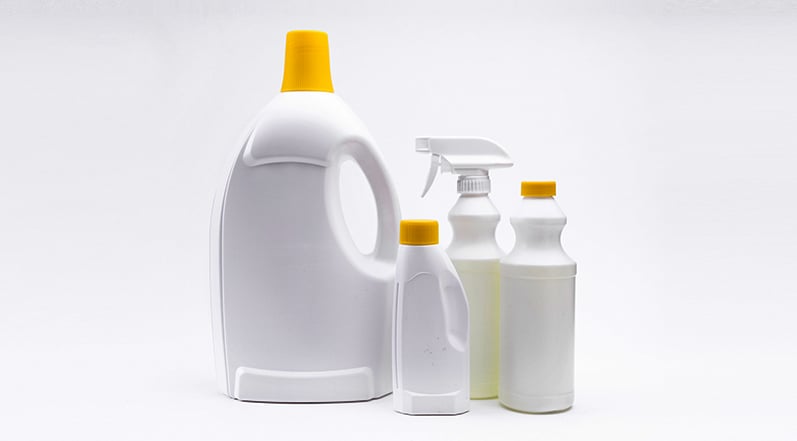
It’s worth noting that consumers only have access to a less potent form of bleach than professionals– hardware stores will only carry bleach solutions at 6.5% compared to the 12.5% sodium hypochlorite that a professional will use.
There are also a number of roof cleaning solutions available that you can purchase, as well as natural options such as vinegar.
-
Work From the Top to the Bottom
Once you’ve selected your cleaner, it’s time to get your garden sprayer and mix your solution.
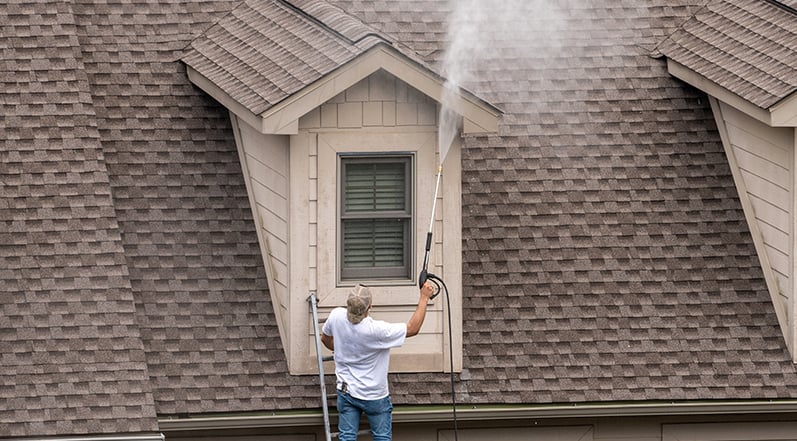
As you begin cleaning the roof, you’ll want to start high on the roof and begin applying an even coat of your solution. Work your way from the top to the bottom in order to cover your entire roof with the solution.
-
Double Treat Problem Areas
If there are any areas of your roof that have a lot of algae growth, you might want to add a second coat of the cleaning chemical after about five minutes. There are different types of algae and moss that can grow on roofs, some of which are heartier than others. When using a bleach solution, algae and moss should either disappear or turn white when it has been effectively killed.
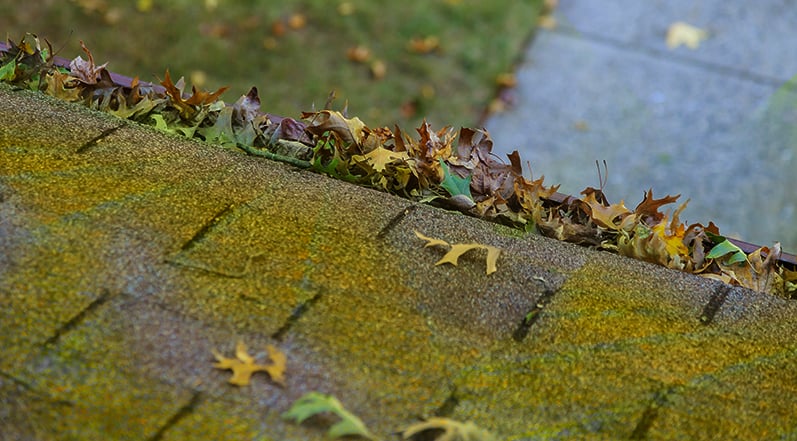
Depending on the chemical you choose to clean your roof, it’s possible that you will have to spray it down one more time to rinse your roof. If using a bleach solution, you’ll want to allow it to sit on the shingles for 15 to 20 minutes before you thoroughly rinse it off.
How Often Should You Clean Your Roof?
It’s generally advised to have your roof cleaned at least once a year. For brand-new roofs or roofs that you know are in very good shape, you might be able to get away with a roof cleaning once every two years.
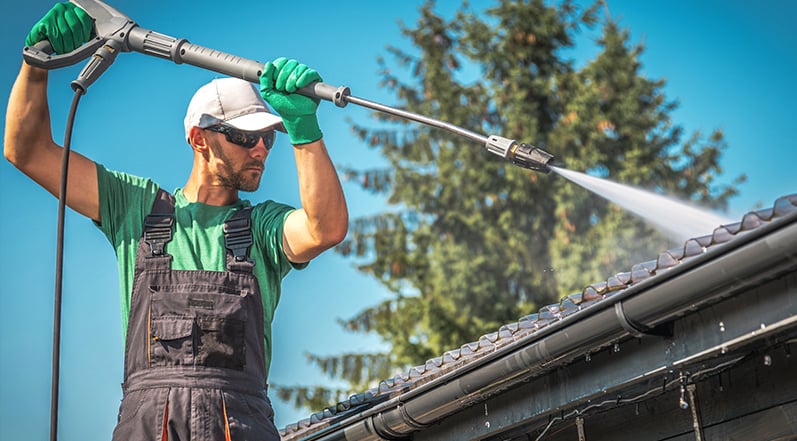
One of the benefits of having an annual roof cleaning is that it allows you to become aware of any issues with your roof early on. Roofing problems that you aren’t aware of can grow larger and more expensive as time goes on, and the sooner you discover that your roof needs some attention, the less costly the repair will be.
Should You Clean Your Roof Yourself?
The answer to this question depends on a number of factors– including how easy it is for you to safely access your roof, the type of roofing system you have, how tall your building is, and how comfortable you feel being on a ladder and performing this type of work on your own.
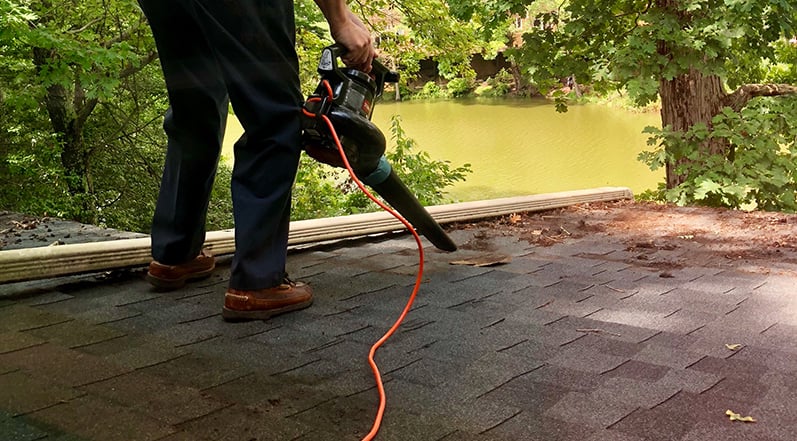
There are a lot of risks involved with cleaning your own roof, covering everything from property damage to personal injuries. If you are going to take on the project of cleaning your own roof, you’ll want to make sure you take all necessary safety precautions.
Roof Cleaning FAQ
Now, let’s take a look at some of the most commonly asked questions about roof cleaning.
How Long Does It Take to Clean a Roof?
The size of your roof and the type of roof are going to impact how long the process takes. Many professional roofing companies can clean a typical roof in about 2-5 hours.
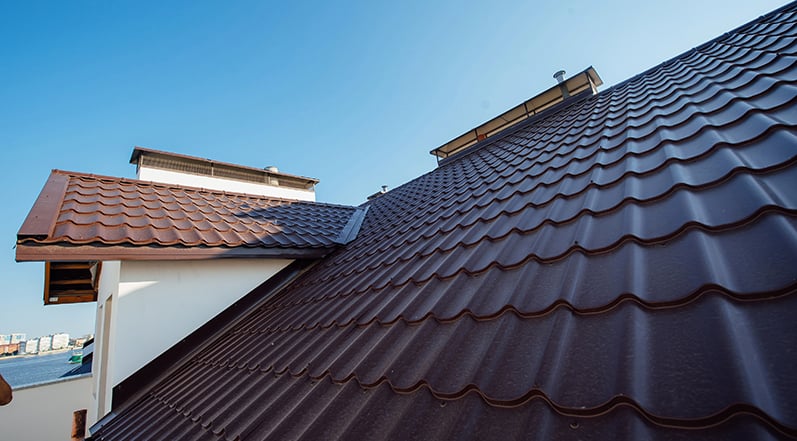
If you are going to be taking on the project yourself and you’ve never done it before, you should assume that it will take quite a bit longer once you factor in the time it takes to research how to clean the roof, take the necessary safety precautions, and acquire the new skill of mixing chemicals and evenly coating your roof before rinsing.
How Much Does It Cost to Clean a Roof?
The cost of roof cleanings will vary depending on your location, the size of your roof, the number of stories on your home or building, the type of roofing system, the cleaning method you choose, and other variables.
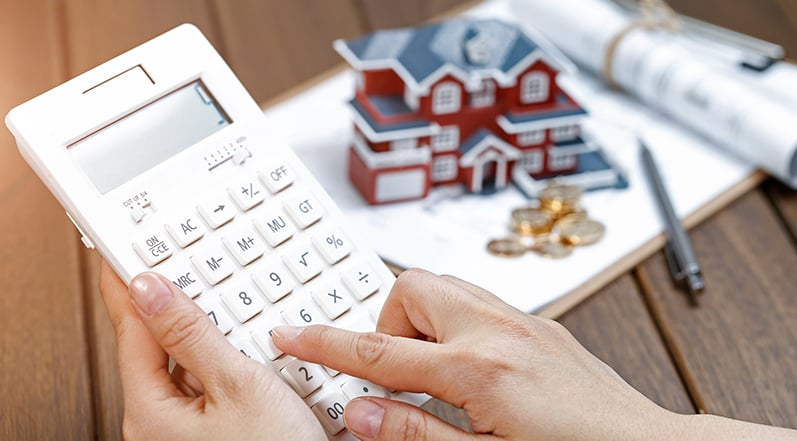
On average, it costs between $0.20 and $0.70 to clean a roof per square foot. This means that a 2,000-square-foot roof will cost between $400 and $1,400 to clean.
What Are the Benefits of Cleaning a Roof?
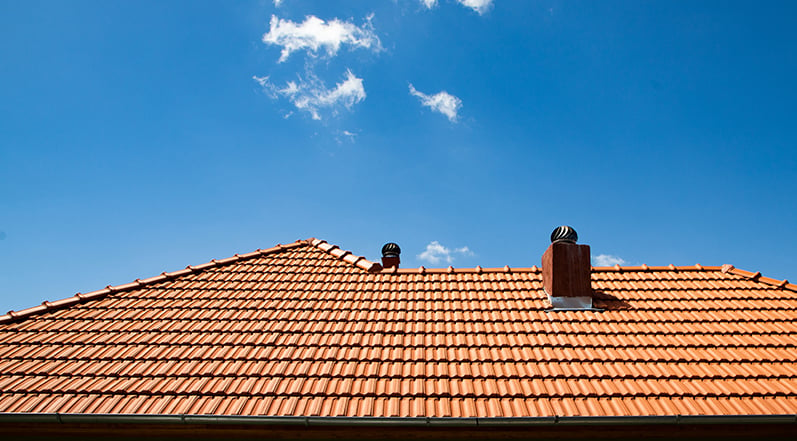
There are a number of reasons it’s worth cleaning your roof once a year, including:
- ● Helping to prevent your roof from damage due to moss or algae growth
- ● Allowing you (or a roofing professional) to notice any other potential issues that could become more expensive problems down the road
- ● Extending the life of your roof
- ● Protecting your shingle warranty
- ● Boosting your home’s curb appeal
- ● Saving you money in the long run by helping to prevent costly repairs
What Is the Best Time of Year to Clean a Roof?
Where you live is going to have a big impact on the best time of year to clean a roof. If you’re wondering if today is a good day for roof cleaning, you’ll want to make sure that temperatures have been above freezing for at least four hours. This ensures that roof cleaning is comfortable and safe for you or your roofing company and helps prevent ice from building up on your shingles.
In many places across the U.S., spring or summer is a great time for cleaning roofs, while individuals in more southern locations might prefer to clean their roofs in the fall or winter.
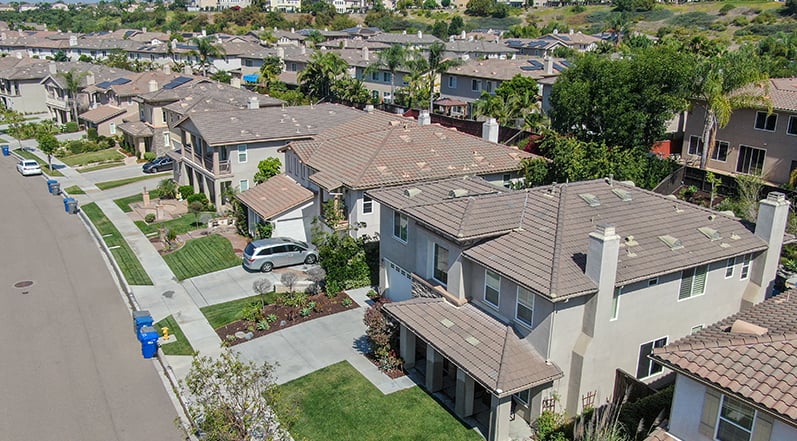
Ultimately, the time of year is less important than the weather conditions on the day that you choose to wash your roof. Of course, you’ll want to make sure it’s warm enough to do so. Beyond that, you actually want to look for a cloudy rather than sunny day to ensure that the bleach solution doesn’t evaporate too fast. Additionally, you don’t want to clean your roof on a windy day or a day when there is precipitation.
Can Cleaning a Roof Improve Energy Efficiency?
Yes, cleaning your roof can help improve your home’s energy efficiency. For example, if your roof is covered in dark algae, this can mean that your roof absorbs more heat and, in turn, increases the temperature in your attic. The result is that your A/C has to run more often and endure more wear and tear.
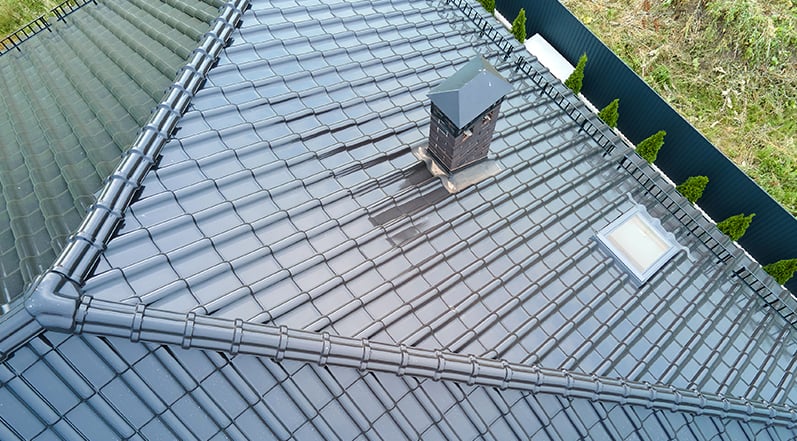
In addition, some roofing materials are designed these days to reflect heat from the sun and therefore reduce the temperature of your roof. These are known as “cool roofs,” and they can help you save money on your utility bills and increase the lifespan of your A/C system. Keeping your cool roof clean can help ensure that the maximum reflective surface is available.
Can Cleaning a Roof Increase Your Home’s Value?
If you are planning on putting your house on the market, you’ve probably thought about applying a fresh coat of paint to the interior and exterior of your home. But what about cleaning your roof?
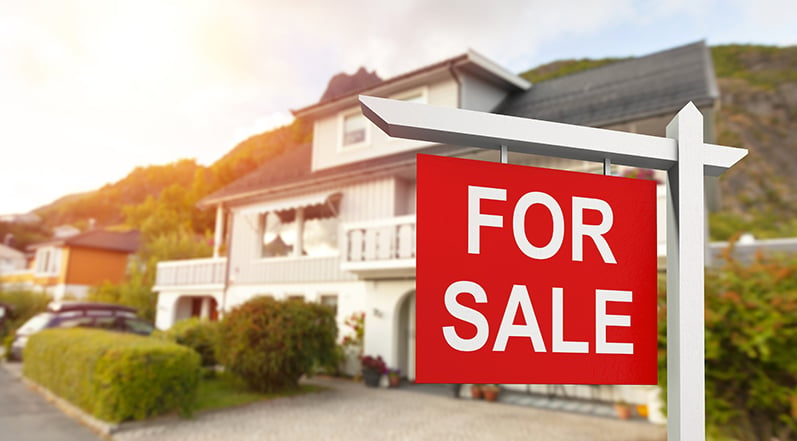
Ensuring that your roof looks its best can help create a good first impression of your home– a clean roof indicates a well-maintained roofing system and home.
Can Cleaning a Roof Extend Its Lifespan?
Some experts estimate that regularly cleaning your roof can help to extend its life span by up to twice its remaining life.
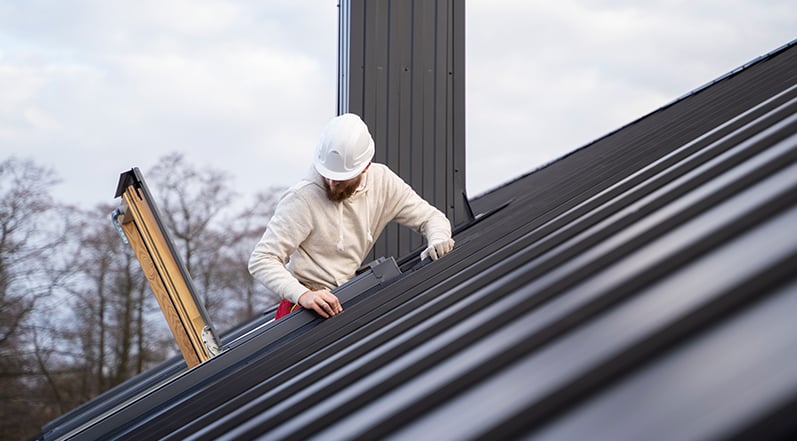
Considering how expensive it is to replace your roof, the cost of cleaning your roof is well worth the investment!
Is It Time For a Roof Cleaning?
Roof cleaning can be a tempting DIY project, but there are a number of risks you’ll want to consider before taking on the project. Not only do you have to be careful to make sure that you don’t damage your roof with the chemical solution you choose, but you’ll also need to ensure your landscaping and soil are protected before beginning. On top of that, working on a ladder or getting up on your roof can be very dangerous if you don’t take the proper safety precautions, and the last thing you want is to injure yourself by trying to save a few bucks cleaning your roof on your own.
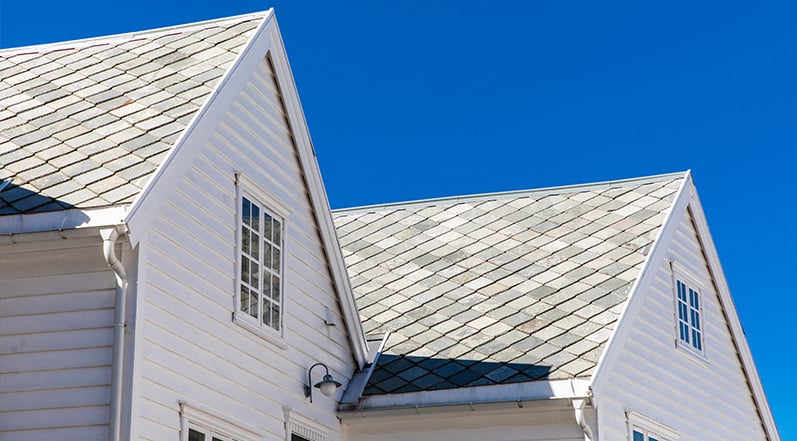
If you do decide to hire out the job and you’re in the Atlanta area, give Colony Roofers a call. We’d love to come out and give you a free estimate for your roof cleaning– contact us today to get started!
 Call (678) 365-3138
Call (678) 365-3138